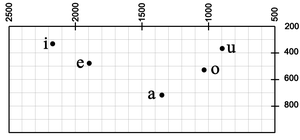
When the Web first blossomed as a publishing medium at scale, there were plenty of e-initiatives — “e” for “electronic.” There were e-page numbers, e-pages, and e-publications. E’s heritage as a lowercase guide to novel digital approaches — with its current place in the e-book world, or a world with eTrade, Esurance, or eBay — is both rich and slightly trite at this point.
Perhaps e lost its mojo in most spaces when its more upright and personality-endowed fellow vowel, i, moved from the lowly iMac to the ubiquitous iPod, the revolutionary iTunes, the game-changing iPhone, and the publishing-centric iPad. Apple has claimed the i stands for Internet, but since Internet is a proper noun and requires capitalization, this rationale has only rankled grammarians as well. Apple wasn’t alone in utilizing the i, with iGoogle being perhaps the best-known — unless you’re in Canada, where you might use the iCoke Web site.
At this point, it seems vowels might have been worn out. Where are their category mates? Perhaps o and u and a feel, in order, too personal, too depressing, and too silly to be much help in the marketing mix. In fact, there’s a more scientific reason why the others haven’t been enlisted in this marketing-intensive naming frenzy — i and e have much higher formant values than a, o, or u, or alternative pronunciations of any vowels. Higher formants are usually easier to distinguish in speech, so they gain your attention, thereby acquiring more utility in marketing. And the power of i and e holds true for not only English, but most languages.
Once these two powerful vowels became overworked, where to turn?
To x, of course, as in Xterra, Xbox, xfinity, XM radio, X-games, and X-Men. Aside from its most familiar use in x-ray (dating back to 1895), x has recently proven even more versatile, moving nicely into place at the end of words, as in mathematical nomenclature, with TEDx and MITx being two recent examples of this new formulation. Of course, first Times Square and the seedy bookshops had to be cleared of XXX, but once x regained its innocence, the race was on. Perhaps Gen-X is the inspiration for all of this x-ing, or the trailing influence of Unix, but in any event, x is the new e or i. There’s more to x, as well — it gets into your throat and snaps out, making it a powerful consonant when deployed as [eks] in x-ray rather than [z] in xylophone. Pronouncing x is like detonating a small firecracker.
This all has come to represent a a very minimalist approach to neologisms. Rather than trying to logically couple root words and drawing on historical and shared language markers, marketers and other word mavens are going for more primal, phonetic experiences. Perhaps it’s part of the internationalization of the world, where it makes more sense to address a shared anatomy than a presumption of shared Western culture.
Is the future really the e-future? Or the iFuture? Or the xFuture? Or FutureX? Whichever it is, it’s sounding a little more forced and a little less elegant than the past.
Discussion
8 Thoughts on "The Little Letters in Our Lives — e to the i to the x"
You have seen the trend but failed to appreciate the significance. e …i… x … Clearly the world is doomed. We are going to fall off the end of the alphabet.
I wonder why YouTube didn’t call itself uTube. Or maybe the future is vowel-free e.g. just ‘ftr’. Or bk for book, jrnl for journal and Rtcls for articles?
Notice that they needed two u’s (You and Tube) to get to a powerful “u” vowel impact. UUNet was another from a bygone era.
uTube was already taken by a company when YouTube was started.
If “e” is tapped out, what does this bode for the new HHMI/Wellcome journal titled “eLife”?
And how much of this is just done in order to create a unique combination of letters to boost findability by search engines?
IBM tried to make an impact with “e-“, the letter written as the a in “@”. e.g. “e-business”, http://en.wikipedia.org/wiki/Electronic_business. Wikipedia puts the date as 1996.



